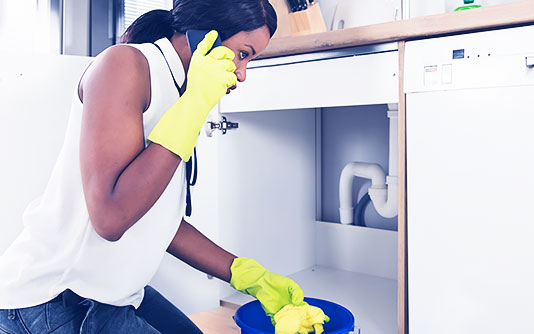
The cost of repairing any water damage can be substantial. It is vital for you, whether in the capacity of a business owner, home owner or tenant, to understand the potential causes of water leakage and minimize the risk of these incidents occurring.
Before you can really assess the scale of the damage, you must trace the source of the leak, which is not always easy to do.
In this guide, we set out simple steps which can not only prevent leaks from occurring, but also ensure your safety and reduce damage to a building or dwelling resulting from water leakages.
There are two common factors that may influence the likelihood of a water leak:
Workmanship
Upgrading and modernizing a property is a positive move, however, adding plumbed appliances such as toilets and showers can present water hazards if not done correctly. Valves mistakenly left open after changing the water supply can also lead to leaks. Plumbing improvements or repairs should always be carried out by an experienced and qualified plumber who can provide assurance that the correct fixtures and fittings have been used and installed to mitigate chances of water damage.
Older properties suffer gradual wear and tear, so water pipes should be inspected and replaced as soon as wear and tear is noticed to prevent the risk of water leaking.
Climate
Humidity can cause corrosion in pipework which can go unnoticed. This is particularly prevalent in unoccupied properties and when water pipes are infrequently used. The damage caused by such an incident can be extensive and possibly spread to the surrounding walls, exteriors, floors, furniture and electrical appliances. Regular routine inspections can identify small problems before they become much greater.
How can you limit the risk of water leaking?
Follow the steps below to ensure you have preventative measures in place:
- Stay vigilant for signs of water leaks including water stains, rust, cracks, soft and swollen areas in the walls, damaged paint, warping of wooden floors and surfaces, dampness, odors and mold. If you find any leaks, quickly isolate them;
- Conduct regular inspections of all accessible connections to pipes, tanks, water heaters, pumps, washing machine hoses and valves, including the surrounding sealant or caulking which should be free from gaps;
- Check for signs of dripping including in cabinets and under basins and repair any dripping taps as soon as possible. Until then, collect leaking water so it does not cause further water damage;
- Ensure overflows are free from blockages and not leaking;
- Have contact numbers of experienced plumbers in the event of an emergency
Take note if your water bills increase significantly or water pump is running more often. Technological devices such as a remote meter reading and warning system are valuable in identifying a water leak in a supply system. These devices analyze water usage and identify an irregular change in the pattern of water consumption that may be an early warning of a leak. Some of these devices can be linked to your smartphone for notification when you are away from home and automatically switch off the water supply in the event of a leak.
In the event of water damage, Argus can assist you with a claim. Whether a business owner, a home owner or a tenant you should be covered against water damage that is caused by the escape of water.
For more information about Argus Commercial Insurance please look here, and for information about Argus Home and Contents Insurance, please see here. Or if you would like to speak to someone directly please call our Customer Service Centre on 298 0888.







